Pioneering Work on Acute Respiratory Infection (ARI)
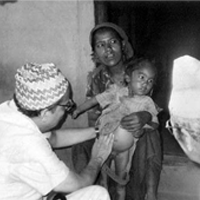 MSMT initiated action research work on the community diagnosis and management of childhood pneumonia on the outskirts of Kathmandu in early eighties. It was later expanded to the remote district Jumla. Besides saving thousands of innocent lives, this pioneering work of the Trust led to the formulation of childhood pneumonia management strategy in the whole South Asia Region. It also helped in the formation of Nepal's national plan of action for ARI. More importantly, the Trust's work on ARI formed a part of the formulation of WHO and UNICEF policy in this regard.. The recognition of the Trust on this subject is apparent from its publications. MSMT initiated action research work on the community diagnosis and management of childhood pneumonia on the outskirts of Kathmandu in early eighties. It was later expanded to the remote district Jumla. Besides saving thousands of innocent lives, this pioneering work of the Trust led to the formulation of childhood pneumonia management strategy in the whole South Asia Region. It also helped in the formation of Nepal's national plan of action for ARI. More importantly, the Trust's work on ARI formed a part of the formulation of WHO and UNICEF policy in this regard.. The recognition of the Trust on this subject is apparent from its publications.
|
Domestic Air Pollution
MSMT Pioneering work on Indoor Air Pollution. The problem of air pollution affecting mainly women, children and the poor was well recognized by the Trust since its very inception in 1975. However, the community based action research program was initiated only in 1978. The first publication of the research outcome in Thorax received global attention as shown by the request for 500 copies of its reprint. It raised national and international interest in the impact of indoor air pollution on health. WHO and World Bank are now prioritizing this problem. |
Pioneering Work in the Fight Against Tobacco Use (Anti-tobacco Activities)
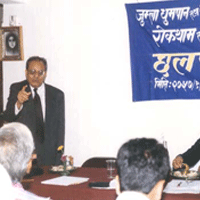 MSMT, since its very beginning, is playing a proactive role in the fight against tobacco use. The Maiden anti-tobacco workshop in Nepal was organized by the Trust in 1976. The Trust conducted epidemiological studies on tobacco smoking behavior among adults and young people with special reference to attitude and belief in 1984. It has also conducted a number of community based action research projects for the prevention and control of tobacco use in the country. MSMT, since its very beginning, is playing a proactive role in the fight against tobacco use. The Maiden anti-tobacco workshop in Nepal was organized by the Trust in 1976. The Trust conducted epidemiological studies on tobacco smoking behavior among adults and young people with special reference to attitude and belief in 1984. It has also conducted a number of community based action research projects for the prevention and control of tobacco use in the country.
|
Heart Disease
A number of action research projects and publications have been launched by the Trust under the leadership of Dr. Mrigendra Raj Pandey, the founder of the Trust. The Trust has strived to achieve sound heart through holistic approach including the spiritual dimension for the prevention and control of increasing cardiovascular problem in the country. The advocacy to address the problem is focused on four areas, namely, regular exercise, vegetarian low fat diet, stress reduction and avoiding active and passive smoking. |
Hygiene and Sanitation
Latrines were introduced to improve the health and hygiene of the people. 187 improved toilets have completed at appropriate places of various villages. This cost effective scheme has evoked a wide acceptance in the rural community. |
Drinking Water Program
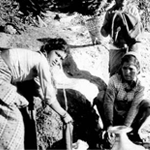 In the backward areas, women were found to be overburdended with not only managing the household chores but also spending considerable time and labor in fetching drinking water from a distant source. The sanitation level was also found to be quite deplorable. To improve situation, the Trust constructed water tanks and arranged polythene pipes to bring water from the source and store and convenient places. In the backward areas, women were found to be overburdended with not only managing the household chores but also spending considerable time and labor in fetching drinking water from a distant source. The sanitation level was also found to be quite deplorable. To improve situation, the Trust constructed water tanks and arranged polythene pipes to bring water from the source and store and convenient places. |
Nutrition Program
Vitamin 'A' supplementation program was initiated in Jumla in early 90s with remarkable success of 99% coverage of below 5 years. Later on, this has been a national strategy. At present, the Village Health Workers (VHWs) of the Trust in Jumla are helping the government vitamin 'A' supplementation program in Jumla. Besides this, the success in the promotion of kitchen gardening and increasing awareness for mixed diet with adequate amount of vegetable is the focus of the Trust. The following publication signifies the work of the Trust:
Childhood mortality after a high dose of Vitamin 'A' in a high risk population. BMJ, 25 Jan 1992, Vol. 304, pp. 207-210. |
Income Generating Activities
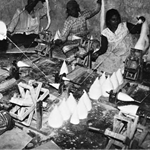 The Trust realized that the poor people need mostly some extra money to raise their standard of living. Merely giving medicines is not enough. This income generation activity was deemed necessary – Charkha (Spinning Wheel). Spinning wheels were distributed to the poor women of the villages who make yarns and sell it to the carpet weavers. There is a good market and the income was satisfactory. Kitchen Gardening: Good vegetable seeds were also distributed to improve the kitchen gardening. The Trust realized that the poor people need mostly some extra money to raise their standard of living. Merely giving medicines is not enough. This income generation activity was deemed necessary – Charkha (Spinning Wheel). Spinning wheels were distributed to the poor women of the villages who make yarns and sell it to the carpet weavers. There is a good market and the income was satisfactory. Kitchen Gardening: Good vegetable seeds were also distributed to improve the kitchen gardening. |
Educational and Research Promotion
The Trust has been distributing various scholarship to poor and meritorious students of Jumla, Sundarijal, Talku, Chhaimale etc. There is also a research wing to make various survey on public health problems. A lot of publications have materialized as a result of the various study of blood pressure, cor pulmonary, ARI, indoor air pollution, smoking, heart diseases etc. In Jumla it was found that highest number of men and women 70% were found to be smokers. As it is a great health hazard an anti smoking program has been launched. The target is to educate the teachers, public personnel and school children and nursing women about the harms of smoking and the diseases it can bring out. This education program has been warmly received by the local people and smoking is reduced considerably. |
Cost Effective Social Program
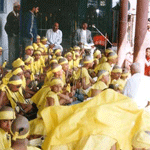 Another area of social service that we focused on was group vratabandha (initiation of sacred thread wearing). People were stuck in the trap of traditional way of spending too much on religious rituals such as the vratabandha of boys and wedding ceremonies. We saw that poor parents were falling into life-long debts because of the expenses on these ceremonies. The whole nation including all the six VDCs had fallen into this trap. So we wanted to introduce some reforms in the tradition without undermining the spirit of the rituals as such, but avoiding extravagant ways of performing them. We took up the vratabandha ritual for our reform. 1 Accordingly, we organized a group vratabandha in 1988 at Sundarijal Swasthya Sewa Mandir , where 103 boys were initiated en masse. Our initiative to deal with this situation has become popular among the villagers who have continued the practice of group vratabandha . By 2009, some 2969 boys have been initiated including the ones in Chhaimale at Chundevi Temple, in cooperation with the Chundevi Social Service Committee and our Trust. Now this programme is being followed and performed by many other organizations, and we feel grateful to them. Another area of social service that we focused on was group vratabandha (initiation of sacred thread wearing). People were stuck in the trap of traditional way of spending too much on religious rituals such as the vratabandha of boys and wedding ceremonies. We saw that poor parents were falling into life-long debts because of the expenses on these ceremonies. The whole nation including all the six VDCs had fallen into this trap. So we wanted to introduce some reforms in the tradition without undermining the spirit of the rituals as such, but avoiding extravagant ways of performing them. We took up the vratabandha ritual for our reform. 1 Accordingly, we organized a group vratabandha in 1988 at Sundarijal Swasthya Sewa Mandir , where 103 boys were initiated en masse. Our initiative to deal with this situation has become popular among the villagers who have continued the practice of group vratabandha . By 2009, some 2969 boys have been initiated including the ones in Chhaimale at Chundevi Temple, in cooperation with the Chundevi Social Service Committee and our Trust. Now this programme is being followed and performed by many other organizations, and we feel grateful to them. |

